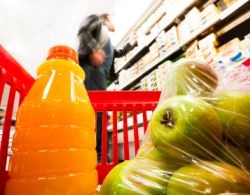Sustainability Update: Food and Beverages
January 12, 2010

The food and beverage category remains central to consumer perceptions of sustainability. In fact, many of the attributes consumers generally use to describe quality eating experiences also resonate as sustainable.
Consumers use the notion of freshness, for example, to describe quality as well as sustainable food products. Because freshness resonates as sustainable, packaging communications for sustainable foods should connect products to their natural, earthly source, bearing images and descriptions of the raw ingredientsalong with sourcing cues as to where ingredients are grown, emphasizing local connections where relevant.
Some core sustainability consumers now view local as more important than organic. Consumers think of local as meaning at least regional in provenance, and of locations within a 50- to 100-mile radius of home as truly local. While local lacks the standardization of the organic designation, the sense of knowability related to the who, how and where of local foods leads many sustainability minded consumers to place local foods at least on par with organic. These consumers credit local and organic foods with the absence of the negatives (i.e., factory farming, industrial processing and over-packaging) they associate with conventional farming and food products.
Given the economic collapse and the continued fragility of the economy, even committed sustainability consumers have had to rethink purchases that cost more, and generally speaking, consumer willingness to pay more for environmentally friendly products has slipped down a notch. However, Experian Simmons data show no drastic change in consumer propensity to purchase organic or natural foods between spring 2008, before the economic collapse, and summer 2009, in the wake of it. The percentage of adults who agree a lot that they look for organic or natural foods edged down only slightly, from 14 percent to 13.5 percent, while the percentage who agree a little has slid downward even less.
Consumers who seek sustainable products are less likely to make tradeoffs and cutbacks in product categories they view as essential to their quality of lifenotably including groceries. Overall consumption of sustainable foods should remain strong as most of the core sustainability consumers remain steadfast in their shopping. And even more peripheral sustainability shoppers will curb sustainable grocery expenses less than they do more costly eating and wellness outlays, notably including dining out.
As The Hartman Group reports in its Sustainability: The Rise of Consumer Responsibility (2009), consumers are keenly aware of the role retailers play in providing sustainable product options. Farmers markets and specialty retailers act not only as product suppliers, but also as evangelists for sustainable food trends. Walmart and conventional supermarket chains have also stepped up to the plate.
Retailers are significantly stressing sustainability outside of the consumer packaged goods (CPG) aisles. Safeway, with one-third of its U.S. stores located in agriculture-rich California, promotes its extensive and competitively priced selection of local produce. The desire to balance a commitment to sustainable products with the need to cut costs has also raised interest in the signature merchandizing format of the natural food sector: bulk foods. Many conventional grocers are expanding their bulk food selections as more consumers migrate to bulk products. Buying locally grown produce and bulk food products are ideal sustainable shopping strategies in a weak economy. Sustainability prioritizes the stewardship of resources, which includes containing costs by minimizing waste and unnecessary expense. American consumers can be expected to continue in this mode even as the economy works its way out of recession.
David Sprinkle is the research director, Market Research Group, at Packaged Facts . This article, the second of a four-part series, draws on Consumers and Sustainability: Food and Beverage, a joint publication of The Hartman Group and Packaged Facts. More information is available online at PackagedFacts.com/Hartman-Packaged-Facts-2108839 .
About the Author(s)
You May Also Like




.png?width=800&auto=webp&quality=80&disable=upscale)